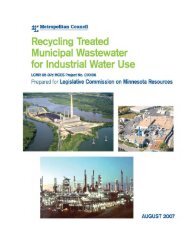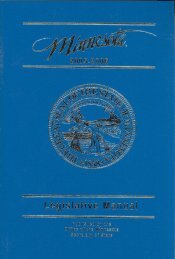Minnesota Board of Pharmacy - Minnesota State Legislature
Minnesota Board of Pharmacy - Minnesota State Legislature
Minnesota Board of Pharmacy - Minnesota State Legislature
Create successful ePaper yourself
Turn your PDF publications into a flip-book with our unique Google optimized e-Paper software.
complaint investigation and disciplinary actions - activities that the <strong>Board</strong> has been engaged in since it<br />
was established in 1885. As noted in the previous section, elimination <strong>of</strong> licensing would put the <strong>State</strong><br />
<strong>of</strong> <strong>Minnesota</strong> at odds with several significant federal laws and rules - and would potentially result in<br />
the loss <strong>of</strong> approximately $150 million in federal funding. Licensing fees are also the basis for the<br />
<strong>Board</strong>’s funding. The <strong>Board</strong> is currently receiving over 20 complaints per month from the public. Many<br />
<strong>of</strong> the complaints involve pharmacists and technicians who are significantly impaired due to chemical<br />
dependency or mental illness. Investigation <strong>of</strong> other complaints <strong>of</strong>ten reveals practice violations which,<br />
though they are not so severe as to warrant discipline, do require corrective action on the part <strong>of</strong> the<br />
licensee. Routine inspections also frequently reveal practice violations that need to be corrected to<br />
reduce the risk <strong>of</strong> patient harm. For these reasons, the <strong>Board</strong>’s most important priorities are licensing,<br />
inspections, complaint investigations and disciplinary activities.<br />
Most <strong>of</strong> the expenditures spent on administration are for renting the <strong>Board</strong>’s <strong>of</strong>fice and purchasing<br />
equipment and supplies. The health related licensing boards recently negotiated a new lease that<br />
actually lowered rents. The <strong>Board</strong> has also taken steps to control expenditures on equipment and<br />
supplies. However, equipment does wear out and supplies are consumed. Without having an <strong>of</strong>fice to<br />
work in and adequate equipment and supplies, the <strong>Board</strong> could not function. Consequently, this area <strong>of</strong><br />
the budget is also a priority.<br />
The Executive Director (ED) and <strong>Board</strong> Surveyors are licensed pharmacists with, collectively, over<br />
200 years <strong>of</strong> experience working in a variety <strong>of</strong> pharmacy settings. As such, their advice is sought on a<br />
daily basis by pharmacists and other licensees and registrants. The ED and Surveyors provide<br />
consultations on issues that are <strong>of</strong>ten extremely technical and complex. For example, Surveyors<br />
regularly work with pharmacists, architects and engineers to provide advice concerning compliance<br />
with the United <strong>State</strong>s Pharmacopeia Chapter 797 standards for sterile compounding. The goal <strong>of</strong> all<br />
consultations is to promote both adherence to laws and rules and the adoption <strong>of</strong> cutting edge standards<br />
<strong>of</strong> practice and technology that help protect the health, welfare and safety <strong>of</strong> citizens. There are a few<br />
private sector consultants who are experts in certain areas <strong>of</strong> pharmacy practice and <strong>Board</strong> staff already<br />
refers some inquiries to those consultants. However, if the ED and Surveyors stopped responding to<br />
those daily requests for advice, it is likely that the public would be at increased risk <strong>of</strong> harm. It is also<br />
likely that the <strong>Board</strong> would receive additional complaints regarding dispensing errors and adverse drug<br />
events. In the judgment <strong>of</strong> the <strong>Board</strong>, it is better to provide consultation and education “up front” in<br />
order to prevent errors than it is to investigate a complaint after the error has occurred. Consequently,<br />
while it might be possible to divert some expenditure in this area to inspections, the <strong>Board</strong> believes that<br />
some priority must be given to consultation and education.<br />
Most <strong>of</strong> the expenditures in the rules and legislative area are for the time spent by the Executive<br />
Director responding to legislative requests for technical assistance and preparing legislatively mandated<br />
reports. It is the <strong>Board</strong>’s understanding that it must provide such technical assistance to legislators<br />
when it is requested. That being the case, the levels <strong>of</strong> expenditures in this area will be entirely<br />
dependent on the number <strong>of</strong> requests for technical assistance and reports that are received and the<br />
complexity <strong>of</strong> the issues involved. Presumably, members <strong>of</strong> the <strong>Legislature</strong> would want the <strong>Board</strong> to<br />
make responding to their requests for technical assistance a priority.<br />
The Prescription Monitoring Program (PMP) is the newest <strong>of</strong> the <strong>Board</strong>’s functions, having become<br />
fully operational in April <strong>of</strong> 2010. The PMP was created by an act <strong>of</strong> the <strong>Legislature</strong> that enjoyed<br />
broad bipartisan support. It has also proven to be a very popular program, with over 5,500 pharmacists<br />
and prescribers enrolled as users. Law enforcement has served the <strong>Board</strong> with over 180 search<br />
44

















